| Listing 1 - 10 of 10 |
Sort by
|
Book
ISBN: 1350000108 1350000086 9781350000094 1350000094 9781350000087 9781350000100 9781350000070 1350000078 Year: 2017 Publisher: London
Abstract | Keywords | Export | Availability | Bookmark
 Loading...
Loading...Choose an application
- Reference Manager
- EndNote
- RefWorks (Direct export to RefWorks)
"This book examines the 1871 unification of Germany through the prism of one of its 'forgotten states', the Kingdom of Württemberg. It moves beyond the traditional argument for the importance of the great powers of Austria and Prussia in controlling German destiny at this time. Bodie A. Ashton champions the significance of Württemberg and as a result all 38 German states in the unification process, noting that each had their own institutions and traditions that proved vital to the eventual shape of German unity. The Kingdom of Württemberg and the Making of Germany, 1815-1871 demonstrates that the state's government was dynamic and in full control of its own policy-making throughout most of the 19th century, with Ashton showing a keen appreciation for the state's domestic development during the period. The book traces Württemberg's strong involvement in the national question, and how successive governments and monarchs in the state's capital of Stuttgart manoeuvred the country so as to gain the greatest advantage. It successfully argues that the shape of German unification was not inevitable, and was in fact driven largely by the desires of the Mittelstaaten, rather than the great powers; the eventual Reichsgründung of January 1871 was merely the final step in a long series of negotiations, diplomatic manoeuvres and subterfuge, with Württemberg playing a vital, regional role. Making use of a wealth of primary sources, including telegrams, newspaper articles, diary entries, letters and government documents, this is a vitally important study for all scholars and students of 19th-century Germany."--Bloomsbury Publishing.
Württemberg (Kingdom) --- Germany --- Politics and government. --- History
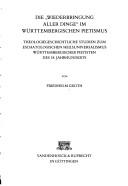
ISBN: 3525558058 Year: 1984 Publisher: Göttingen Vvandenhoeck & Ruprecht
Abstract | Keywords | Export | Availability | Bookmark
 Loading...
Loading...Choose an application
- Reference Manager
- EndNote
- RefWorks (Direct export to RefWorks)
Eschatology --- Pietism --- Restorationism --- 284.971 --- 284.971 Piëtisme --- Piëtisme --- Evangelicalism --- Last things (Theology) --- Religious thought --- Theology, Doctrinal --- Apocatastasis --- Universalism --- History of doctrines --- History --- Württemberg (Germany) --- Würtemberg (Germany) --- Wirtemberg (Germany) --- Wuerttemberg (Germany) --- Württemberg-Hohenzollern (Germany) --- Württemberg-Baden (Germany) --- Württemberg (Germany : Landesbezirk) --- Württemberg (Kingdom) --- Church history. --- Christian dogmatics --- anno 1700-1799 --- Germany
Book
ISBN: 0521473020 052148331X 0511470681 Year: 1995 Publisher: Cambridge : Cambridge University Press,
Abstract | Keywords | Export | Availability | Bookmark
 Loading...
Loading...Choose an application
- Reference Manager
- EndNote
- RefWorks (Direct export to RefWorks)
This book provides a radical new interpretation of the aims of the lesser German princes during the seventeenth and eighteenth centuries through the example of the duchy of Württemberg. Arguing that the princes' political ambitions were fundamental in shaping the internal development of their territories, the author sheds new light on the political importance of the notorious German 'soldier trade' and its role in international diplomacy. The wider social and political impact of these policies is also investigated in a comparative framework, while traditional interpretations of the dramatic struggle between duke and estates are challenged in a reassessment of the role of early modern representative institutions in German state development. The relationship of these internal political struggles to the different elements of the Holy Roman Empire is revealed, opening up new perspectives on the role of the German states within the imperial structure and revealing the empire as a flawed but functioning political system.
Arts and Humanities --- History --- Social classes --- Württemberg (Germany) --- Holy Roman Empire --- History, Military. --- Politics and government. --- Class distinction --- Classes, Social --- Rank --- Caste --- Estates (Social orders) --- Social status --- Class consciousness --- Classism --- Social stratification --- Würtemberg (Germany) --- Wirtemberg (Germany) --- Wuerttemberg (Germany) --- Württemberg-Hohenzollern (Germany) --- Württemberg-Baden (Germany) --- Württemberg (Germany : Landesbezirk) --- Württemberg (Kingdom)
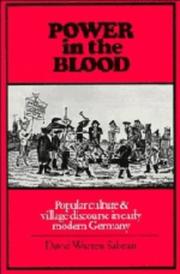
ISBN: 0521264553 9780521264556 Year: 1984 Publisher: Cambridge : Cambridge University Press,
Abstract | Keywords | Export | Availability | Bookmark
 Loading...
Loading...Choose an application
- Reference Manager
- EndNote
- RefWorks (Direct export to RefWorks)
Wurttemberg (Germany) --- Neckarhausen (Nurtingen, Germany) --- Religious life and customs --- Social life and customs --- -Neckarhausen (Nurtingen, Germany) --- -Wurttemberg (Germany) --- -Religious life and customs --- Neckarhausen (Nürtingen, Germany) --- Württemberg (Germany) --- Würtemberg (Germany) --- Wirtemberg (Germany) --- Wuerttemberg (Germany) --- Württemberg-Hohenzollern (Germany) --- Württemberg-Baden (Germany) --- Württemberg (Germany : Landesbezirk) --- Württemberg (Kingdom) --- Religious life and customs. --- Social life and customs. --- Wurttemberg (Germany) - Religious life and customs --- Wurttemberg (Germany) - Social life and customs --- Neckarhausen (Nurtingen, Germany) - Religious life and customs --- Neckarhausen (Nurtingen, Germany) - Social life and customs
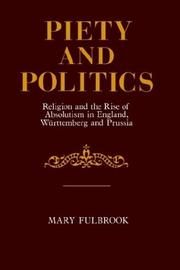
ISBN: 0521276330 0521256127 0511562624 9780521276337 9780511562624 9780521256124 Year: 1983 Publisher: Cambridge : Cambridge University Press,
Abstract | Keywords | Export | Availability | Bookmark
 Loading...
Loading...Choose an application
- Reference Manager
- EndNote
- RefWorks (Direct export to RefWorks)
In the context of continuing debates over Protestantism, capitalism and the absolutist state, this book presents a fresh historical and theoretical analysis of religion and politics in early modern Europe. The author undertakes a systematic comparative-historical analysis of the very different contributions made by the Puritan and Pietist movements to the success or failure of absolutist rule in England, Württemberg and Prussia. While Puritans and Pietists shared similar religious ideas, aspirations and ethos, they developed quite different political attitudes and alliances in each case. English Puritans made a crucial contribution to the overthrow of attempted absolutism, as the English Revolution helped ensure the further development of parliamentary rule. Pietists in Württemberg shared the anti-absolutist attitudes of the English Puritans, yet tended to remain politically passive in the constitutional struggles against absolutism. And in complete contrast, Pietists in Prussia made a vital positive contribution to the successful establishment of the militaristic, bureaucratic Prussian absolutist state.
Puritans --- Pietism --- History --- Great Britain --- Württemberg (Germany) --- Prussia (Germany) --- England --- Politics and government --- Church history --- Württemberg (Germany) --- Church history. --- Politics and government. --- Arts and Humanities --- Puritans - England - History - 17th century --- Pietism - Germany - Württemberg - History - 17th century --- Pietism - Germany - Prussia - History - 17th century --- Great Britain - Politics and government - 1603-1714 --- Württemberg (Germany) - Politics and government --- Prussia (Germany) - Politics and government - 17th century --- England - Church history - 17th century --- Württemberg (Germany) - Church history --- Prussia (Germany) - Church history --- Germany --- Evangelicalism --- Preussen (Germany) --- Prusse (Germany) --- Prusy (Germany) --- Prusyah (Germany) --- Prussia (Kingdom) --- Würtemberg (Germany) --- Wirtemberg (Germany) --- Wuerttemberg (Germany) --- Württemberg-Hohenzollern (Germany) --- Württemberg-Baden (Germany) --- Württemberg (Germany : Landesbezirk) --- Württemberg (Kingdom)
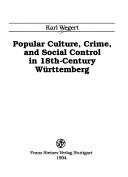
ISBN: 3515064664 Year: 1994 Publisher: Stuttgart Steiner
Abstract | Keywords | Export | Availability | Bookmark
 Loading...
Loading...Choose an application
- Reference Manager
- EndNote
- RefWorks (Direct export to RefWorks)
#VCV monografie 2000 --- Crime --- Popular culture --- Social control --- Social conflict --- Sociology --- Liberty --- Pressure groups --- Culture, Popular --- Mass culture --- Pop culture --- Popular arts --- Communication --- Intellectual life --- Mass society --- Recreation --- Culture --- City crime --- Crime and criminals --- Crimes --- Delinquency --- Felonies --- Misdemeanors --- Urban crime --- Social problems --- Criminal justice, Administration of --- Criminal law --- Criminals --- Criminology --- Transgression (Ethics) --- History --- Germany --- Württemberg --- Social aspects --- Württemberg (Germany) --- Würtemberg (Germany) --- Wirtemberg (Germany) --- Wuerttemberg (Germany) --- Württemberg-Hohenzollern (Germany) --- Württemberg-Baden (Germany) --- Württemberg (Germany : Landesbezirk) --- Württemberg (Kingdom) --- Social life and customs.
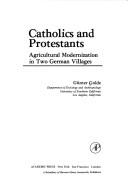
ISBN: 0122882504 Year: 1975 Publisher: New York Academic press
Abstract | Keywords | Export | Availability | Bookmark
 Loading...
Loading...Choose an application
- Reference Manager
- EndNote
- RefWorks (Direct export to RefWorks)
316:2 <43> --- Godsdienstsociologie--Duitsland voor 1945 en na 1989 --- Wurttemberg (Germany) --- -Rural conditions --- Church and social problems --- Farm life --- Villages --- Case studies. --- 316:2 <43> Godsdienstsociologie--Duitsland voor 1945 en na 1989 --- Hamlets (Villages) --- Village government --- Cities and towns --- Rural life --- Country life --- Christianity and social problems --- Social problems and Christianity --- Social problems and the church --- Social problems --- Case studies --- Württemberg (Germany) --- Würtemberg (Germany) --- Wirtemberg (Germany) --- Wuerttemberg (Germany) --- Württemberg-Hohenzollern (Germany) --- Württemberg-Baden (Germany) --- Württemberg (Germany : Landesbezirk) --- Württemberg (Kingdom) --- Rural conditions.
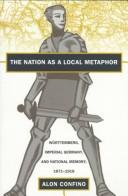
ISBN: 0807860840 9780807860847 0807823597 0807846651 9780807823590 9780807846650 0807846600 9780807846605 9798890868817 Year: 1997 Publisher: Chapel Hill University of North Carolina Press
Abstract | Keywords | Export | Availability | Bookmark
 Loading...
Loading...Choose an application
- Reference Manager
- EndNote
- RefWorks (Direct export to RefWorks)
All nations make themselves up as they go along, but not all make themselves up in the same way. In this study, Alon Confino explores how Germans turned national and argues that they imagined the nation as an extension of their local place. In 1871, the work of political unification had been completed, but Germany remained a patchwork of regions with different histories and traditions. Germans had to construct a national memory to reconcile the peculiarities of the region and the totality of the nation. This identity project, examined by Confino as it evolved in the southwestern state of Wurttemberg, oscillated between failure and success. The national holiday of Sedan Day failed in the 1870s and 1880s to symbolically commingle localness and nationhood. Later, the idea of the Heimat, or homeland, did prove capable of representing interchangeably the locality, the region, and the nation in a distinct national narrative and in visual images. The German nationhood project was successful, argues Confino, because Germans made the nation into an everyday, local experience through a variety of cultural forms, including museums, school textbooks, popular poems, travel guides, posters, and postcards. But it was not unique. Confino situates German nationhood within the larger context of modernity, and in doing so he raises broader questions about how people in the modern world use the past in the construction of identity.
Nationalism --- National characteristics, German. --- Collective memory --- National characteristics, German --- Germany --- Regions & Countries - Europe --- History & Archaeology --- Collective remembrance --- Common memory --- Cultural memory --- Emblematic memory --- Historical memory --- National memory --- Public memory --- Social memory --- Memory --- Social psychology --- Group identity --- National characteristics --- German national characteristics --- Consciousness, National --- Identity, National --- National consciousness --- National identity --- International relations --- Patriotism --- Political science --- Autonomy and independence movements --- Internationalism --- Political messianism --- Württemberg (Germany) --- Würtemberg (Germany) --- Wirtemberg (Germany) --- Wuerttemberg (Germany) --- Württemberg-Hohenzollern (Germany) --- Württemberg-Baden (Germany) --- Württemberg (Germany : Landesbezirk) --- Württemberg (Kingdom) --- Politics and government. --- Politics and government --- Collective memory.
Book
ISBN: 9780521833004 9781107499706 9780511596858 9780511596452 0511596456 0511596855 9781316087909 1316087905 0521833000 1107499704 051169900X 128230318X 9786612303180 0511593686 0511592752 0511595611 0511596057 Year: 2015 Publisher: Cambridge Cambridge University Press
Abstract | Keywords | Export | Availability | Bookmark
 Loading...
Loading...Choose an application
- Reference Manager
- EndNote
- RefWorks (Direct export to RefWorks)
This work brings together, for the first time in English translation, Hegel's journal publications from his years in Heidelberg (1816-18).
History of philosophy --- Hegel, Georg W.F. --- Philosophers --- Philosophy --- Mental philosophy --- Humanities --- Hegel, Georg Wilhelm Friedrich --- Jacobi, Friedrich Heinrich, --- Hegel, Giorgio Guglielmo Frederico --- I︠A︡kobi, Fridrikh Geĭnrikh, --- Jacobi, F. H. --- Württemberg (Germany) --- Würtemberg (Germany) --- Wirtemberg (Germany) --- Wuerttemberg (Germany) --- Württemberg-Hohenzollern (Germany) --- Württemberg-Baden (Germany) --- Württemberg (Germany : Landesbezirk) --- Württemberg (Kingdom) --- Politics and government --- Philosophy. --- Hegel, Georg Wilhelm Friedrich, --- Jacobi, Wilhelm Heinrich, --- Hēgeru, --- Hei-ko-erh, --- Gegelʹ, Georg, --- Hījil, --- Khegel, --- Hegel, G. W. F. --- Hegel, --- Hei Ge Er, --- Chenkel, --- Hīghil, --- הגל, --- הגל, גאורג וילהלם פרידריך, --- הגל, גיאורג וילהלם פרידריך, --- הגל, ג.ו.פ, --- היגל, גורג ווילהלם פרדריך, --- היגל, גיורג וילהלם פרידריך, --- 黑格尔, --- Hegel, Guillermo Federico, --- Hegel, Jorge Guillermo Federico, --- Heyel, Georg Wilhelm Friedrich, --- Higil, Gʼūrg Vīlhim Frīdrīsh, --- هگل, --- هگل، گئورگ ويلهم فريدريش, --- Wurttemberg (Germany)
Book
ISBN: 3805326254 9783805326254 Year: 2000 Volume: 181 Publisher: Mainz am Rhein von Zabern
Abstract | Keywords | Export | Availability | Bookmark
 Loading...
Loading...Choose an application
- Reference Manager
- EndNote
- RefWorks (Direct export to RefWorks)
Clergy --- Family life surveys --- Family relationships --- History --- Conduct of life --- 284.1 <43> "16" --- -Clergy --- -Family life surveys --- -Social surveys --- Clergy members --- Clergymen --- Indigenous clergy --- Major orders --- Members of the clergy --- Ministers (Clergy) --- Ministers of the gospel --- Native clergy --- Ordained clergy --- Ordained ministers --- Orders, Major --- Pastors --- Rectors --- Religious leaders --- Lutheraanse hervorming. Reformatie van Luther--Duitsland voor 1945 en na 1989--17e eeuw. Periode 1600-1699 --- -History --- -Family relationships --- -Major orders --- Wurttemberg (Germany) --- -Religious life and customs --- -Lutheraanse hervorming. Reformatie van Luther--Duitsland voor 1945 en na 1989--17e eeuw. Periode 1600-1699 --- -Wurttemberg (Germany) --- 284.1 <43> "16" Lutheraanse hervorming. Reformatie van Luther--Duitsland voor 1945 en na 1989--17e eeuw. Periode 1600-1699 --- Social surveys --- Württemberg (Germany) --- Würtemberg (Germany) --- Wirtemberg (Germany) --- Wuerttemberg (Germany) --- Württemberg-Hohenzollern (Germany) --- Württemberg-Baden (Germany) --- Württemberg (Germany : Landesbezirk) --- Württemberg (Kingdom) --- Religious life and customs. --- Diocesan clergy --- Ecclesiastics --- Secular clergy --- Clergy - Family relationships - History - 17th century. --- Clergy - Conduct of life - History - 17th century. --- Clergy - Germany - Wurttemberg - History - 17th century. --- Family life surveys - Germany - Wurttemberg.
| Listing 1 - 10 of 10 |
Sort by
|

 Search
Search Feedback
Feedback About UniCat
About UniCat  Help
Help News
News